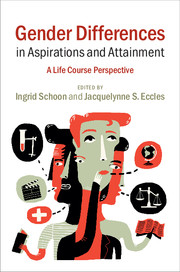Book contents
- Frontmatter
- Contents
- List of Figures
- List of Tables
- Notes on Contributors
- List of Abbreviations (selected)
- Part I Introduction
- Part II The early school years
- Part III Career planning during adolescence
- Part IV Choosing a science career
- 9 Do teenagers want to become scientists?
- 10 Predicting career aspirations and university majors from academic ability and self-concept
- 11 Does priority matter?
- 12 Gender differences in personal aptitudes and motivational beliefs for achievement in and commitment to math and science fields
- 13 What happens to high-achieving females after high school?
- 14 Young people, gender, and science
- 15 Motivational affordances in school versus work contexts advantage different individuals
- Part V Longer-term consequences of early experiences
- Part VI The role of context
- Index
- References
10 - Predicting career aspirations and university majors from academic ability and self-concept
A longitudinal application of the internal–external frame of reference model
Published online by Cambridge University Press: 05 October 2014
- Frontmatter
- Contents
- List of Figures
- List of Tables
- Notes on Contributors
- List of Abbreviations (selected)
- Part I Introduction
- Part II The early school years
- Part III Career planning during adolescence
- Part IV Choosing a science career
- 9 Do teenagers want to become scientists?
- 10 Predicting career aspirations and university majors from academic ability and self-concept
- 11 Does priority matter?
- 12 Gender differences in personal aptitudes and motivational beliefs for achievement in and commitment to math and science fields
- 13 What happens to high-achieving females after high school?
- 14 Young people, gender, and science
- 15 Motivational affordances in school versus work contexts advantage different individuals
- Part V Longer-term consequences of early experiences
- Part VI The role of context
- Index
- References
Summary
Abstract
Science, technology, engineering, and mathematics university majors are critical pathways toward prestigious careers, yet women are still underrepresented in many of these domains. In this chapter, we review the role that self-beliefs play in the development of educational aspirations and attempts to realize those aspirations at the end of secondary school. In particular, we use the internal/external frame of reference model to explore the potential of achievement and self-concept profiles as predictors of university major aspirations and attainment as one possible explanation for gender differences in these domains. After reviewing previous research in this area, we provide a research example using a large longitudinal database from Germany (N = 1,881). Results suggest that (a) high math achievement and self-concept predicted math-intensive university major choice and lower likelihood of entering verbal-intensive majors (and vice versa); (b) there appeared to be a continuum of university majors such that strong mathematics achievement and self-concept profiles predicted entry into hard sciences, while the opposite profile predicted entry into the humanities with biology and medicine displaying more mixed patterns; and (c) after controlling for achievement and self-concept there were still important gender differences in university majors. Implications for theory and practice are discussed.
Information
- Type
- Chapter
- Information
- Gender Differences in Aspirations and AttainmentA Life Course Perspective, pp. 224 - 246Publisher: Cambridge University PressPrint publication year: 2014
References
Accessibility standard: Unknown
Why this information is here
This section outlines the accessibility features of this content - including support for screen readers, full keyboard navigation and high-contrast display options. This may not be relevant for you.Accessibility Information
- 20
- Cited by
